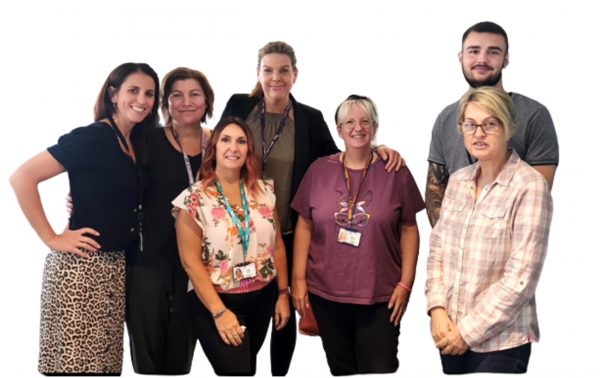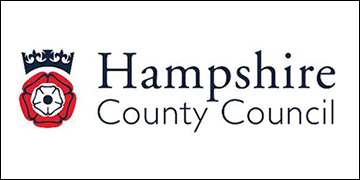Despite some of the complexities that come with supporting young people through transition into adulthood, two social care practitioners at Hampshire County Council credit the career opportunities, management support and access to specialist expertise as key reasons why they value working in the Independent Futures Team (IFT).
Hampshire’s IFT was a finalist in the Team of the Year, adult services category in the 2022 Social Worker of the Year Awards. The recognition was specifically linked to the work IFT does to provide social workers with access to expertise in specialist areas.

Members of Hampshire County Council’s IFT team
For Harry, a senior case worker in the team, working in IFT has allowed him to take his first steps towards becoming a qualified social worker.
And Sharon, a senior case worker*, is cultivating specialist skills after taking up a one-year-long secondment on Hampshire’s Trauma Informed Care Project.
Transitions team
The team consists of a team manager and seven social care practitioners, that include senior social workers, social workers, and senior case workers.
Each year, around 150 young people turn 18 and some require mental, learning, and physical disabilities support from IFT. The team also provides support by signposting and sharing information and advice to those who do not meet eligibility.
“The aim is to ensure that there is an agreed care plan in place by the time the young person is 17 and a half,” says IFT team manager Simone Shears. “But we support younger people from the age of 14 years old – if necessary, right up until they are ‘settled’ (up to 25yrs).
“If these young people are known to children’s services at 14 years old, we can gently touch base with them, attend review meetings and school meetings and get an idea of their needs ahead of their assessment.”
The benefits of this model to the young person and their family are that they have a consistent allocated worker, a single point of contact for their preparation for adulthood.

by Valerii Honcharuk – AdobeStock
Mental health
When increased demand for mental health support within IFT did not match the skillset available in the team, Simone was able to access funding for the mental health specialism, from within Hampshire County Council’s mental health service.
“With more people having to stay at home during the pandemic, we saw demand for mental health support increase,” she says. “We noticed that some young people with autism [for example] became very anxious because they could not attend school and did not have that structure and routine they were used to. Meanwhile, public services were stretched and we also noticed that social workers that worked in this area were feeling a little out of their depth and needed support.
“We recruited a practitioner with mental health expertise, which helped enormously [and complemented existing social work expertise in the team] and resulted in the team feeling more confident when supporting young people.”
That’s what I enjoy doing – building those relationships, seeing what those professionals have to offer the young person, how it fits with IFT and how we can all work together.
A stepping stone
For Harry, who joined IFT in 2020, working with young people with learning and physical disabilities has been a rewarding career change.
He started out in Hampshire County Council handling safeguarding calls in a call centre and has recently started a degree in Hampshire as a social work apprentice.
“The child-to-adult transition is so important in IFT,” he says. “Every service comes together. You get to work in some of the early childhood teams, such as fostering and adoption as well as looking in the next step after transition and working with young adults. It is also a great opportunity for us to understand better how we work with those agencies such as the police and health services.
“So, for people who maybe don’t know what they want to do; don’t know what their passion is or whether they want to work with children or adults, IFT is a good stepping stone to realising that.”
Access to specialist services
For Sharon, who has worked for Hampshire since 1992 and started at IFT in 2015, the role has created opportunities for her to widen her skillset.
“There is a good support structure, and it gives you time to focus on what you are interested in,” she says. “There are opportunities to learn new things and you can shadow different teams. “There’s also lots of joint working with other agencies – SEND, children’s services, health teams as well as parents, carers and young people.
“You also work with teams across adult services, including the community-based teams, the least restrictive practice team and supported accommodation team. That’s what I enjoy doing – building those relationships, seeing what those professionals have to offer the young person, how it fits with IFT and how we can all work together.”
Trauma-informed practices
Through her role, Sharon has developed an interest in supporting young people using a trauma-informed approach (a practice grounded in the understanding that trauma exposure can impact an individual’s neurological, biological, psychological and social development).
“I am interested in looking at behaviour through a trauma lens,” she says. “You can be working with a young person and see the positive developments they are making in their education, their work, their placements with families but all of that can be put at risk if there is unresolved trauma that impacts on their behaviour.
“Because I had that interest in trauma-informed practices, when the opportunity for secondment in that area came up, I chose to take it – with the support of Simone – and in January this year, started a one-year secondment on Hampshire’s Trauma Informed Care Project.
“I work with providers and get them to approach their work from a trauma-informed perspective, which means working to ensure that that person feels safe, and that they are forming trusting relationships.”

by Valerii Honcharuk – AdobeStock
She recalls a young person she was supporting, while in IFT, who had experienced sexual abuse, and emotional and physical neglect.
“I was undertaking an assessment with the young person and during conversation, it triggered a response which took the young person back to reliving the trauma and abuse.
“She sat underneath the table – that was her way of dealing with it. What trauma-informed practice has taught me is not to underestimate a person’s need to be safe in the environment they are in, the staff they are with or the activity they are doing.
“And rather than label the person as lazy, defiant, or challenging, understand that it is a response to trauma that they have no control over. So, it means using other approaches, such as empathising with the person such as: ‘I hear that that was horrible what happened to you,’ ‘I am so sorry’, ‘how can I make you feel safe in this environment?’ That is what I’ve learnt, and can take back to IFT after my secondment.”
*Sharon has a social work qualification but hasn’t registered with Social Work England, hence can’t use this title. She is employed with Hampshire County Council as a senior case worker.
Read more about adult services at Hampshire County Council here.




 Facebook
Facebook X
X LinkedIn
LinkedIn Instagram
Instagram